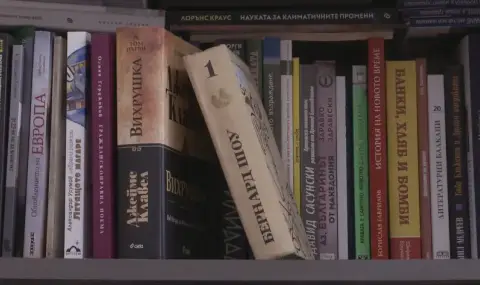On the Internet everything more supporters gather petition to take down the play "Guns and the Man" from the National Theatre. The text is by the Irish satirist and playwright Bernard Shaw, and the production is directed by John Malkovich. Numerous internet publications have come out against the play. Is the dramatic work really offensive to the Bulgarians and belittles them? See the development of BNT.
We read the play to check if this is true.
According to the authors of the petition and the protesters against the play, in it the Bulgarian soldiers are presented as drunkards, and our people are barbaric, illiterate, simple and unwashed. We find the text difficult, because its only translation into Bulgarian is completely exhausted. The play is a comedy in three acts. Bernard Shaw ridicules not only the Bulgarians, but everything - the soldiers, the Swiss, the naivety of the people, the meaning of waging wars in general, the military strategy. Playwright and poet Nedyalko Yordanov also read it because of the ferment at the moment and did not find anything offensive to Bulgarians in it.
How does the play begin?
"There was news, there was a battle," says Katerina, "a victorious battle near Slivnitsa. Won by Sergius, he is the hero of the battle, the idol of the regiment".
"Tell me tell me", says Raina
Katerina - "You can't imagine how delightful it was", reads Nedyalko Yordanov.
The play begins with the spectacular victory of Bulgaria over Serbia.
"Our valiant, amazing Bulgarians, with shining sabers and eyes that flashed like an avalanche, with thunder and lightning, blew away the wretched Serbs and their Austrian contes like chaff. Can this thing be called an anti-Bulgarian play, it is a praise of the Bulgarian army and it is no coincidence that it is about the victory at Slivnitsa, yesterday was the anniversary of this victory and that is why I cannot understand - in fact, if these people read the play, they will be ashamed of what they did".
The play is hard to find in our country, as its only edition in Bulgarian is from 2018, translated by Stoyan Chaprazov and Rayko Chaprazov. It is owned by the publishing house of Sofia University and has long been out of print. There are no copies even in the Metropolitan Library.
"I am surprised, not to say outraged, that this play has been read by almost no one, no one knows this play and I did not know it. A week ago I found it with great difficulty from the publishing house of Sofia University and read it twice. This is a play in praise of Bulgaria, of the Bulgarian soldiers, of the Bulgarian women and men", Nedyalko Yordanov also said.
In the first act, we read the following line of the main character Raina:
"Don't worry about me, If I hear a shot, I'll blow out the candles, crawl into bed and cover my head. The naive belief that one can hide from war like this is funny, but not offensive".
In the play, the Swiss soldier is described as a wealthy heir who decided to run away from his father's home and become a mercenary. He himself claims that he enlisted in the Serbian army because he did not know the Bulgarian army, which he would otherwise have preferred. He says nine out of ten soldiers are born fools. His statement is generally valid, not for the Bulgarian army.
Towards the end of the play, the Bulgarian scolds him for not being a gentleman and having the brain of a grocer, his answer is that this is the Swiss national character. Laughter, not an insult to the Swiss.
"The characters are intelligent, comedic, interesting, loving, not to mention the war - how it is presented," says Yordanov.
In the second act, the author ridicules the conduct of battles, but not specifically by the Bulgarians. On the contrary, the Bulgarian hero utters the line.
"I won the battle the wrong way, while our great Russian generals were losing it the right way. In short, I ruined their plans and hurt their self-esteem.
"War, dear madam, is the coward's art of attacking mercilessly when strong and guarding when weak. This is the whole secret of victory in battle. Surprise the enemy when he is vulnerable, and never, under any circumstances, engage him when he is your equal."
There is not a single hint that the Bulgarians are cowards.
However, the play mentions several times the "dubious hygienic habits" of the Bulgarians. The Bulgarian brags that her family washes their hands almost every day. We see an even rougher joke in the second part of the comedy. Then the head of the family claimed that his father had never bathed in his life and lived to be 98 years old. He scolds his wife for washing her neck every day and therefore catches a cold, labeling such habits as Western.
"Aleko Konstantinov's Bai Gagno. To the wonderful Aleko Konstantinov, they should tear down his monument then. Bai Gagno was always associated then, now it is not used much anymore - it is with Bulgarian. Bai Gagno, beating his chest and saying: "Bulgarian, Bulgarian". And here, perhaps, is the time to recall the words of Bernard Shaw, that comedy is possible only in a highly civilized culture, because the relatively barbaric people do not tolerate the ridicule of their handicaps. The civilized public is happy if they are made to laugh at themselves and recognize the beneficial power of such an undertaking, commented Nedyalko Yordanov.
From what we have read, we can conclude that the claim that the play by the world-famous Irish playwright Bernard Shaw is an insult to Bulgarians is manipulative, BNT concludes its material.
